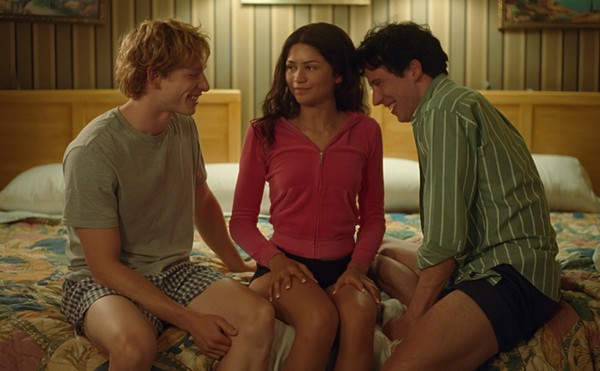It's likely De Niro specifically chose this project -- which is being put out by Franchise Pictures, best known for stars' pet projects, such as Wesley Snipes' The Art of War, Sylvester Stallone's Driven and that John Travolta-in-dreadlocks fiasco we're too polite to mention by name. It also looks to have been waiting a while for distribution; the copyright date is 2001 and the World Trade Center appears in several shots.
The city in question is Long Beach -- the East Coast version, not Snoop Dogg's LBC. Once a thriving seaside community, it's degenerated into a slum that "looks like the Serbian army came through." (Real-life residents of Long Beach may have a bone to pick with this assessment.) Amid the burned-out husks that were once casinos dwells a junkie known as Joey Nova (James Franco), who pawns stolen guitars to feed his drug habit and wistfully dreams that one day he'll escape to the Florida Keys, where he fondly remembers vacationing with his father as a child. Then reality -- and Picasso (Jay Boryea), a drug dealer with Maori face tattoos -- smacks him in the face. There's a knife in play, and soon Picasso's body is dredged from the river, making Joey a wanted man, both by the cops and by Picasso's pals.
That father of whom Joey had such fond memories is, of course, De Niro, herein named Vincent LaMarca. Joey's pleasant recollections are obscured, however, by his hatred for Dad as a result of his bitter divorce and ultimate alienation from both ex-wife and son. De Niro's character has his own issues with his father -- movie screenwriters must have the worst fathers, given how often this theme comes up -- and commitment phobia when it comes to the middle-aged beauty (Frances McDormand) downstairs.
For Franco, the role holds some uncanny coincidences. Having just recently gained the world's notice as the son of the Green Goblin in Spider-Man, he once again plays both the estranged son of a scene-stealing actor, and mortal enemy of a spider, or in this case Spyder (William Forsythe), who drives a motorcycle and sports Michael Douglas' '80s hair and is just a tad miffed that his buddy Picasso croaked without forking over a big wad of cash. Franco also gets to romance another star of Bring It On (following Kirsten Dunst's Mary Jane): Eliza Dushku, who, like Franco, is pinup material in real life but impressively dirtied down for the gritty look required here. Given that Franco's name is above the title on some of the posters, the hope is clearly that this will be his big breakthrough. Could be -- playing a junkie believably is often a major step toward credibility (ask Jennifer Connelly), and he does it well. But, James, for versatility's sake, if you get offered a project with Gabrielle Union and more arachnids, don't take it.
We so often hear the lament that Hollywood films don't have characters we can care about that it's a real pleasure to note that all the people in this one feel fully developed. It'd be nice if there were more of a plot to go along with them -- basically De Niro chases his kid around derelict buildings for the entire movie -- but baby steps are good. Though screenwriter Ken Hixon, who loosely based this screenplay on a 1997 Esquire article, drops the occasional bon mot (an elderly coroner gets the best line in the movie: "I had to jerk off twice this morning just to get my heart started"), he makes some things just too obvious. When perennial sidekick George Dzundza (Basic Instinct) tells De Niro, "You'll miss it when it's gone," after De Niro turns down an invite to one of his warm family dinners, he might as well put on a red shirt and beam down with Captain Kirk and Mr. Spock.
The score, meanwhile, could do without the annoying and out-of-place Native American chanting that gets laid on rather thick in some early scenes. Still, it's a testament to De Niro and director Michael Caton-Jones (This Boy's Life) that by movie's end we accept the characters and the film, flaws and all.





